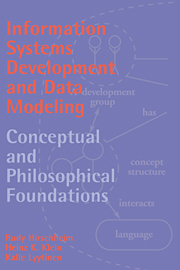Book contents
- Frontmatter
- Contents
- Preface
- Acknowledgements
- 1 Introduction
- 2 Definition and Evolution of Information Systems Development Methodologies and Data Modeling
- 3 Philosophical Foundations
- 4 Conceptual and Paradigmatic Foundations of ISD
- 5 Paradigmatic Analysis of ISD Methodologies
- 6 Conceptual and Paradigmatic Foundations of Data Modeling
- 7 Paradigmatic Analysis of Data Modeling Approaches
- 8 Conclusions
- Appendix A Summaries of Selected Methodologies
- Bibliography
- Index
6 - Conceptual and Paradigmatic Foundations of Data Modeling
Published online by Cambridge University Press: 05 November 2011
- Frontmatter
- Contents
- Preface
- Acknowledgements
- 1 Introduction
- 2 Definition and Evolution of Information Systems Development Methodologies and Data Modeling
- 3 Philosophical Foundations
- 4 Conceptual and Paradigmatic Foundations of ISD
- 5 Paradigmatic Analysis of ISD Methodologies
- 6 Conceptual and Paradigmatic Foundations of Data Modeling
- 7 Paradigmatic Analysis of Data Modeling Approaches
- 8 Conclusions
- Appendix A Summaries of Selected Methodologies
- Bibliography
- Index
Summary
Introduction
This chapter will show that the issues arising in data modeling have close connections to core issues as discussed in the theory of knowledge, epistemology and philosophy of language. The purpose of this chapter is to characterize data modeling in terms of the philosophical debate in these areas and connect it to the four paradigms to the extent as is appropriate. Whilst all of the paradigmatic assumptions have important implications for data modeling, neither the neohumanist nor the radical structuralist paradigm are specifically reflected in the literature on data modeling. Nevertheless, we believe that a neohumanist paradigm could be applied to data modeling. In the following we shall articulate some of its principal implications for data modeling. In addition, while no work has been published on a radical structuralist approach to data modeling (i.e. the equivalent of the UTOPIA project in the process-oriented approaches), we believe that its most important aspect, the articulation of the workers' perspective, could be accomplished within a neohumanist approach.
In order to provide a concrete focus for the philosophical treatment of data modeling in terms of the paradigms, we shall organize the discussion in section 6.3 around the following four questions:
(1) The ontological question (what is being modeled?)
(2) The epistemological question (why is the result valid?)
(3) The social context question (what is the relationship between the social world and data modeling?)
(4) […]
Information
- Type
- Chapter
- Information
- Information Systems Development and Data ModelingConceptual and Philosophical Foundations, pp. 144 - 170Publisher: Cambridge University PressPrint publication year: 1995
